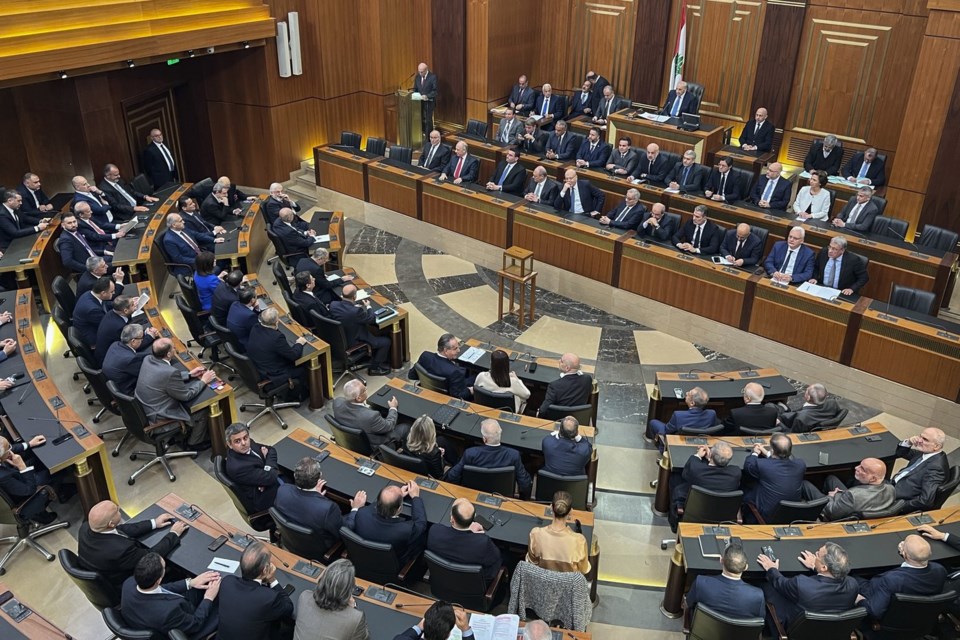BEIRUT (AP) — Lebanon’s parliament voted Thursday to elect the country’s army commander, Joseph Aoun, as head of state, filling a more than two-year-long presidential vacuum.
The vote came weeks after a tenuous ceasefire agreement halted a 14-month conflict between Israel and the Lebanese militant group Hezbollah and at a time when Lebanon’s leaders are seeking international assistance for reconstruction.
Aoun, no relation to former president Michel Aoun, was widely seen as the preferred candidate of the United States and Saudi Arabia, whose assistance Lebanon will need as it seeks to rebuild after between Israel and the Lebanese militant group Hezbollah.
The session was the legislature’s 13th attempt to elect a successor to Michel Aoun, whose term ended in October 2022.
Hezbollah previously backed another candidate, Suleiman Frangieh, the leader of a small Christian party in northern Lebanon with close ties to former Syrian President Bashar Assad. However, on Wednesday, Frangieh announced he had withdrawn from the race and endorsed Aoun, clearing the way for the army chief.
Randa Slim, a senior fellow at the Washington, D.C.-based Middle East Institute, said that the military and political weakening of Hezbollah following its war with Israel and the fall of its ally, Assad, in Syria, along with international pressure to elect a president paved the way for Thursday’s result.
In a first round of voting Thursday, Aoun received 71 out of 128 votes but fell short of the two-thirds majority needed to win outright. Of the rest, 37 lawmakers cast blank ballots and 14 voted for “sovereignty and the constitution.”
In the second round, he received 99 votes.
Lebanon’s fractious sectarian power-sharing system is prone to deadlock, both for political and procedural reasons. The small, crisis-battered Mediterranean country has been through several extended presidential vacancies, with the longest lasting nearly 2 1/2 years between May 2014 and October 2016. It ended when former President Michel Aoun was elected.
The president's role in Lebanon is limited under the power-sharing system in which the president is always a Maronite Christian, the prime minister a Sunni Muslim and the speaker of parliament Shiite.
However, only the president has the power to appoint or remove a prime minister and cabinet. The caretaker government that has run Lebanon for the last two years has reduced powers because it was not appointed by a sitting president.
Joseph Aoun is the fifth former army commander to ascend to Lebanon’s presidency, despite the fact that the country's constitution prohibits high-ranking public servants, including army commanders, from assuming the presidency during their term or within two years of stepping down.
Under normal circumstances, a presidential candidate in Lebanon can be elected by a two-thirds majority of the 128-member house in the first round of voting, or by a simple majority in a subsequent round.
But because of the constitutional issues surrounding his election, Aoun needed a two-thirds majority in the second round to clinch the election.
Aoun, 60, was appointed army chief in March 2017 and had been set to retire in January 2024, but his term was extended twice during the Israel-Hezbollah conflict. He kept a low profile and avoided media appearances and never formally announced his candidacy.
Other contenders included Jihad Azour, a former finance minister who is now the director of the Middle East and Central Asia Department at the International Monetary Fund; and Elias al-Baysari, the acting head of Lebanon’s General Security agency. Al-Baisary announced Thursday that he was pulling out of the race.
The next government will face daunting challenges apart from implementing the ceasefire agreement that ended the Israel-Hezbollah war and seeking funds for reconstruction.
Lebanon is six years into an economic and financial crisis that decimated the country's currency and wiped out the savings of many Lebanese. The cash-strapped state electricity company provides only a few hours of power a day.
The country's leaders reached a preliminary agreement with the IMF for a bail-out package in 2022 but have made limited progress on reforms required to clinch the deal.
Slim, the analyst, said that “the fact that (Aoun) has the backing of Saudi Arabia, the U.S. and the Europeans give him a big boost in terms of being able to get things done,” Slim said.
But he will still have to “navigate the contradiction that are inherent in domestic Lebanese politics,” she said, including relations with Hezbollah, which is not only a militant group but a political party with a strong base of support.
Aoun “has never had a conflictual relationship with Hezbollah, but he has also never acquiesced to Hezbollah,” Slim said.
The army commander’s relative lack of experience with economic matters means he will likely lean heavily on his advisors.
Sally Abou Aljoud And Abby Sewell, The Associated Press

